
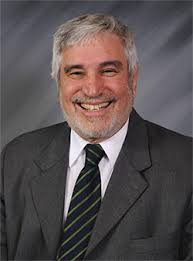
Who is leading the Jamaica Tourism Security Team?
Dr. Peter Tarlow of certified.travel to lead Jamaica Tourism Security team
Visitor surety is top priority for Jamaica Tourism. Dr. Andrew Spencer, Executive Director of the Tourism Product Development Company Ltd. (TPDCo) appointed Dr. Peter Tarlow, Partner of certified.travel, as the head of the new National Jamaica Tourism Security team. TPDCo is the organization charged with the responsibility for Destination Assurance under the directive by its Honorable Minister, Edmund Bartlett, MP.
This follows a number of meetings between Dr. Tarlow and the Hon. Edmund Bartlett, Jamaica Minister of Tourism, with Jamaica Minister of National Security, the Hon. Dr. Horace Chang, and senior members of the Ministry of Tourism (MOT) and its agencies.
Certified.travel is a joint subsidiary of the eTN Corporation and Tourism & More. Dr. Tarlow is a leading industry professional with specific expertise in such areas as:
• The impact of crime and terrorism on the tourism industry
• Event and tourism risk management
• Tourism and economic development
• Development of response models for security threats
• Tourism police and private security personnel and the development of TOPPs units
• Reputational repair or enhancement as needed
Visitor surety means for Jamaica:
• The providing of a safe and secure environment for the Jamaica’s visitors and for those who work in its visitor industry
• Protection of the its tourism sites and infrastructure
• Perceptions of Jamaica including how these perceptions impact its reputation
• The protection of the nation’s economy vis-à-vis its tourism industry
TPDCo’s destination assurance initiatives and strategies are geared towards the following:
1. Jamaica National Development Plan, specifically, Jamaica’s 2030 Vision goal; The Jamaican society is secure, cohesive and just
2. Ministry of Tourism Strategic Business Plan Ensuring the safety, security, and sustainability of the natural and built environments
3. MOT Tourism Pillar of Growth; New Partnerships
Dr. Peter Tarlow pointed out: “Tourism is the world’s leading peaceful industry and a major economic development tool. The tourism industry is also security (crime and terrorism) sensitive, and a lack of tourism surety has a major impact on tourism and event-oriented economies. Additionally, when public officials are tourism-sensitive, they offer the general public better service, economic opportunities, and an improved standard of living.
“The hospitality industry’s number one job is to protect its guests, and visitors demand safety and security by well-trained professionals. If the tourism industry fails in this regard, all else becomes irrelevant.
“Real security involves training, education, investments in software and the understanding that security is not a simplistic discipline or a passing phase. Tourism security personnel need continual training and must be flexible enough to adjust their procedure to a constantly-changing environment. One of the propositions to note is that as customer service increases, so does tourism security, and a better tourism product has the potential to increase national productivity, quality of life, and economic wellbeing. Security plus service and value for money will become the basis for 21st century tourism success!”
eTN Corporation President Juergen Steinmetz said: “We are excited to work with Jamaica Tourism on this important project. Adding Dr. Peter Tarlow to our portfolio of services and in forming certified.travel as a joined partnership is a game changer for the eTN Corporation, eTurboNews, and TravelMarketingNetwork.”
Unfortunately, within the last few months, Jamaica has had to deal with several incidents that have challenged the perception of its security in relation to visitation safety. These incidents have impacted the perception of Jamaica’s tourism product both locally and globally.
Jamaica’s Tourism Minister, Hon. Edmund Bartlett, said: “We must safeguard the key aspects of destination assurance such as security, safety, and seamlessness of our tourism product. Dr. Peter Tarlow and the team will help us take a step in the right direction and provide insight in legislation that may be implemented to make the industry safer, as well as help us develop a new program on how to better relate and interact with international guests. His visit comes at a crucial point in the development of our product.”
More information on the

WTTC: 700,000 Travel & Tourism jobs at risk under No-Deal Brexit
Over 300,000 jobs could be at risk in the Travel & Tourism sector in the United Kingdom and almost 400,000 in Europe if the UK leaves the EU without a deal on 29 March, according to a new analysis from the World Travel & Tourism Council released today.
A “No Deal” Brexit would have a damaging impact on one of the UK’s most important economic sectors.
According to WTTC, which represents the private sector of Travel & Tourism globally, the industry contributes more than €1.5 trillion to the EU’s GDP (10.3% of total) and supports 27.3 million jobs (11.7% of total). In the UK, the sector contributes £213.8 billion to GDP (10.5% of total) and supports four million jobs (11.6% of total).
The WTTC analysis models the impact on the Travel & Tourism sector over the next decade, based on the 7.7% forecasted fall in economic activity across the wider UK economy modelled by the International Monetary Fund (IMF). In this situation, a No Deal Brexit would result in:
- A loss of 308,000 jobs in the UK economy
- A loss of 399,000 jobs in the rest of the EU
- A loss of £18.6 billion in GDP to the UK economy
- A loss of £22.0 billion in GDP to the economies of the rest of the EU
To minimize the impact, it is crucial that:
1. The UK should continue to have access to the Single Aviation Market
2. Visa-free travel between the UK and EU should be maintained and the movement of people should be as seamless as possible while maintaining security
3. The mobility of labor for Travel & Tourism employees across the UK and EU should continue
4. Security co-operation to avoid hard border checks and lengthy delays are paramount
Gloria Guevara, President & CEO, WTTC said, “The UK is the fifth largest Travel & Tourism economy in the world. Given its importance to the UK economy, it is now clear that a No Deal Brexit would have a dramatic impact on one of the UK’s most significant sectors.”
“If the IMF prediction on the wider economy is realised, there would be a total cost across Europe of over £40 billion and over 700,000 jobs compared to our projections. Our Members are already seeing an impact on their businesses and workforce.”

Passed away Dr. Walter Mzembi speaks to eTN from Heaven
The former Minister of Tourism and Hospitality for Zimbabwe, Dr. Walter Mzembi talked to eTurboNews Sunday night from his residence in Johannesburg after social media and numerous Zimbabwe and South African news sources reported that he was at a South African hospital and lost his battle with cancer in the early hours of Saturday morning.
Mzembi told eTurboNews: ” I am talking to you from heaven, but this wasn’t funny. My daughter in Europe was woken up by this news and called me in panic.”
Earlier media reports claiming former Foreign Affairs minister Walter Mzembi has passed on have been dismissed as “idle nonsense” by his former G40 political ally Professor Jonathan Moyo.
The security and political situation in Zimbabwe seems to be escalating.
eTurboNews talked to the Hon Job Sikala, a member of parliament. He said: “We can’t continue living in primitivity in silence. As a lawyer defending 150+ political prisoners, including children as young as 14, the government is using rape as a torture method. People disappear here.”
Zimbabwe President Emmerson Mnangagwa has launched a diplomatic offensive in an effort to tell his side of the story in the face of global condemnation sparked by the deadly clampdown by the army in the aftermath of the January 14 protests against steep fuel price increases.
On Friday, the United States and the United Nations added their weight to calls by the international community for Mnangagwa to rein in the army, which is accused of killing at least 12 people and shooting of over 78 civilians. According to his spokesperson George Charamba, the Zanu PF leader was forced to skip his so-called “Thank You” rally scheduled for Mt Darwin in order to apprise regional leaders about the situation in Zimbabwe ahead of an Africa Union Summit set for Ethiopia in a few days’ time.
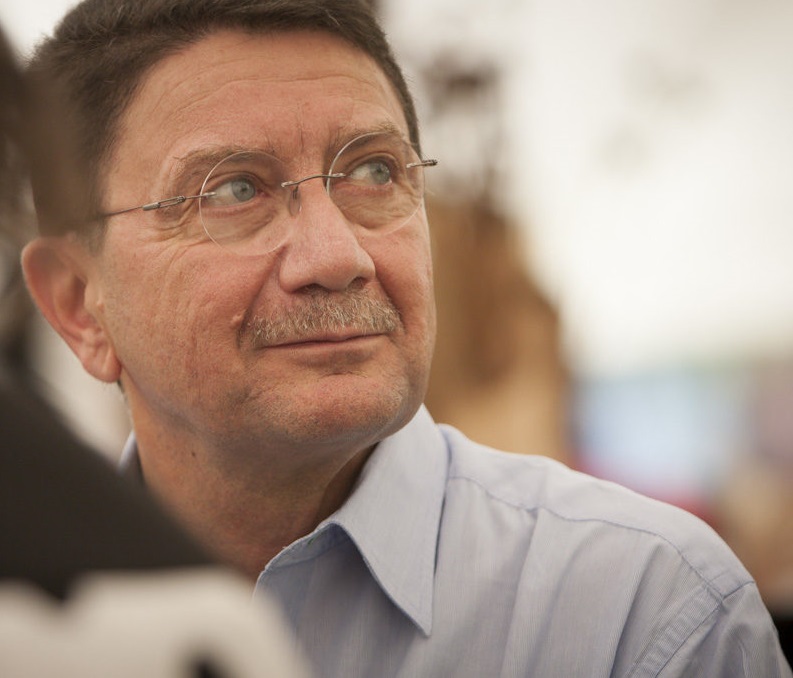
Taleb Rifai concerned about emerging trends in Amsterdam
As former Secretary General of the UNWTO, the specialized agency of the UN mandated with promoting healthy and sustainable tourism, I am watching with concern some of the emerging trends in beautiful Amsterdam. Amsterdam, once known as one of the best examples of a city welcoming sustainable tourism growth in a responsible and manageable manner is starting to turn its back on tourism. Today, I argue, Amsterdam is at an inflection point; it can either use tourism to its advantage or waste the opportunity.
During my career, I have seen cities utilizing the full benefits of tourism and seeing it as an opportunity not only to contribute to the economic well-being of its citizens, but also as a powerful tool for engaging and interacting with other cultures. Such cities use tourism to break down barriers and stereotypes and in turn further tolerance and understanding, contributing to world peace. I have seen Denmark for example engaging with the tourism industry to ensure more tax revenues, London working hard to bring tourism benefits to outer boroughs and now Palermo involving its citizens in tourism decision.
I have also seen cities demonize tourism and reach the quick assumption that the problem is in tourism itself and the very nature of this human activity. The easy conclusion would be, therefore, to cut down the numbers and blame it on easy targets such as Airbnb and others. Such cities choosing for the “easy way out” solutions end up, in many cases, embracing a “populist” approach to their challenges. Such cities rely more on emotions and less on fact, but more seriously and, typical of the populists politics and tactics, appeal to anger and fear, in this case tourism and anything that is different and foreign becomes the enemy. I have seen policy-makers fueling xenophobia in popular European destinations for example, cities that continue promoting its tourist hotspots instead of hidden gems and now Amsterdam wanting to limit its own residents to share their homes with visitors.
Tourism, like any grand human activity, that has grown in an impressive manner in the last 70 years, has a downside to it, but that should never distract us from the opportunities it offers, when well managed, to make this world a better place. Travel and tourism is responsible for over 10 percent of the global GDP, equivalent to 1 in 10 jobs, and grows faster than the global economy itself. The UNWTO estimates that by 2030 there will be 1.8 billion travelers crossing international borders yearly. Whether this translates in 1.8 billion opportunities, or 1.8 billion disasters is up to us and how we manage this impressive growth.
Amsterdam, the city which very foundation is built on openness and trade, the city that invested heavily in growing tourism in the last decade, is today heading down a different path. Instead of preparing for the expected 25 million visitors in 2025, it is focusing on limiting capacity for overnight guests. Instead of allowing more Amsterdammers to profit from tourism, it is proposing to limit and even ban home sharing in certain areas. And instead of growing the current 70,000 tourism related jobs and the over €2 billion direct economic gains generated by tourism, it is choosing to have less and scapegoating tourism.
Once a city becomes known not to welcome more visitors, it will lose everything and not only the numbers that it does not want. Let’s not forget over one in ten jobs are dependent on tourism in Amsterdam.
Rather than continuing its current policies – which it has been pursuing for the last few years without any desired effect – Amsterdam should focus on long term tourism management solutions as tourism continues to grow. Firstly, Amsterdam should focus on maximizing the benefits of tourism to all citizens through creative ideas. Making sure every citizen not only shares in the profits of the tourism business, but actually profits from the very business itself and creates their own self-employment; Secondly, Amsterdam needs to better disperse the crowds of visitors over time and space, to decrease seasonality and alleviate the pressure from the city center and bring economic benefits to communities that have not typically benefited from tourism, beyond tourist hotspots; Lastly, Amsterdam policy-makers need to encourage the tourism industry to come together, boost public-private partnerships and seek collaboration between sectors to catalyze the change needed to keep tourism destinations healthy.
Tourism, when well managed, provides an incredible boost to host communities. I therefore plea to Amsterdam policy-makers to work together with the tourism industry, not against it. Poor management is the demon, the enemy, not tourism and its growth
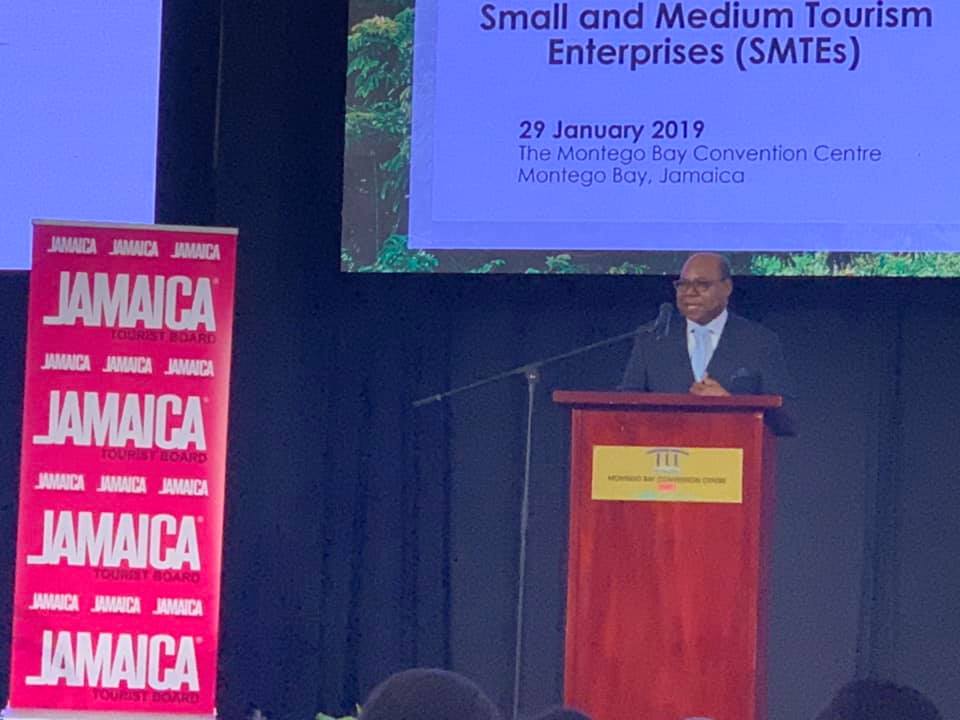
Small- and Medium-sized Businesses are Vital Sources of Stability
With a record-breaking 4.31 million travelers visiting Jamaica in 2018, the island nation’s tourism industry is poised to boost its rate of growth by expanding investments in small- and medium-sized business enterprises (SMTEs), said Jamaica’s Tourism Minister, the Hon. Edmund Bartlett, CD, MP.
Min. Bartlett spoke today at the “Second Global Conference on Jobs and Inclusive Growth: Small and Medium Tourism Enterprises,” which was co-presented by the United Nations World Tourism Organization (UNWTO) and Jamaica’s Ministry of Tourism.
More than 80 percent of tourism is driven by small- and medium-sized enterprises in Jamaica.
“Increasing investment in national economies and its citizens will only result in having greater resources to provide an enhanced visitor experience,” said Min. Bartlett. “Here in Jamaica, it is through a broad range of strategies such as education, specialized training, and credit financing that is enabling us to professionalize Jamaica’s tourism industry, so more of our citizens can be on par with travel professionals around the world.”
More than 200 SMTE members convened at the Montego Bay Convention Centre, in Montego Bay, Jamaica, to participate in discussions led by an impressive roster of local and international speakers and panelists that included: Jamaica’s Minister of Industry Audley Shaw, CD, MP; Jaime Cabal, Deputy Secretary-General, UNWTO; Nestor Mendez, Assistant Secretary General of the Organization of American States; and keynote remarks by Álvaro Uribe Vélez, the former President of Colombia.
“The small- and medium-business sector contributes most to Jamaica tourism, yet only 20 percent of SMTE revenue returns to their benefit,” added Min. Bartlett. “Today, we recharged the dialogue on how to rebalance that anomaly and to back good ideas with investment capital.” He said strategies are in place to allow SMTEs to understand their potential, thereby moving from “mom-and-pop” operators to established, reliable sources of sustainable and long-term income.
Recently, the Ministry of Tourism has directed nearly J$1Billion into the Export–Import Bank of the United States for lending at a rate of four-and-a-half percent to Jamaica’s SMTEs, which has generated an overwhelming response from local small business owners. “To date some J$950 million has been lent to more than 70 entities and they are also making repayments with interest. By April, J$132 million in interest would have been repaid,” Min. Bartlett said.
In addition, the Organisation of American States (OAS) committed a total of US$500,000 to build the resilience of SMTEs to natural disasters and disruptions to tourism. The project, which is being executed over two years, is funded by the United States Department of State and managed by the OAS Secretariat for Integral Development.
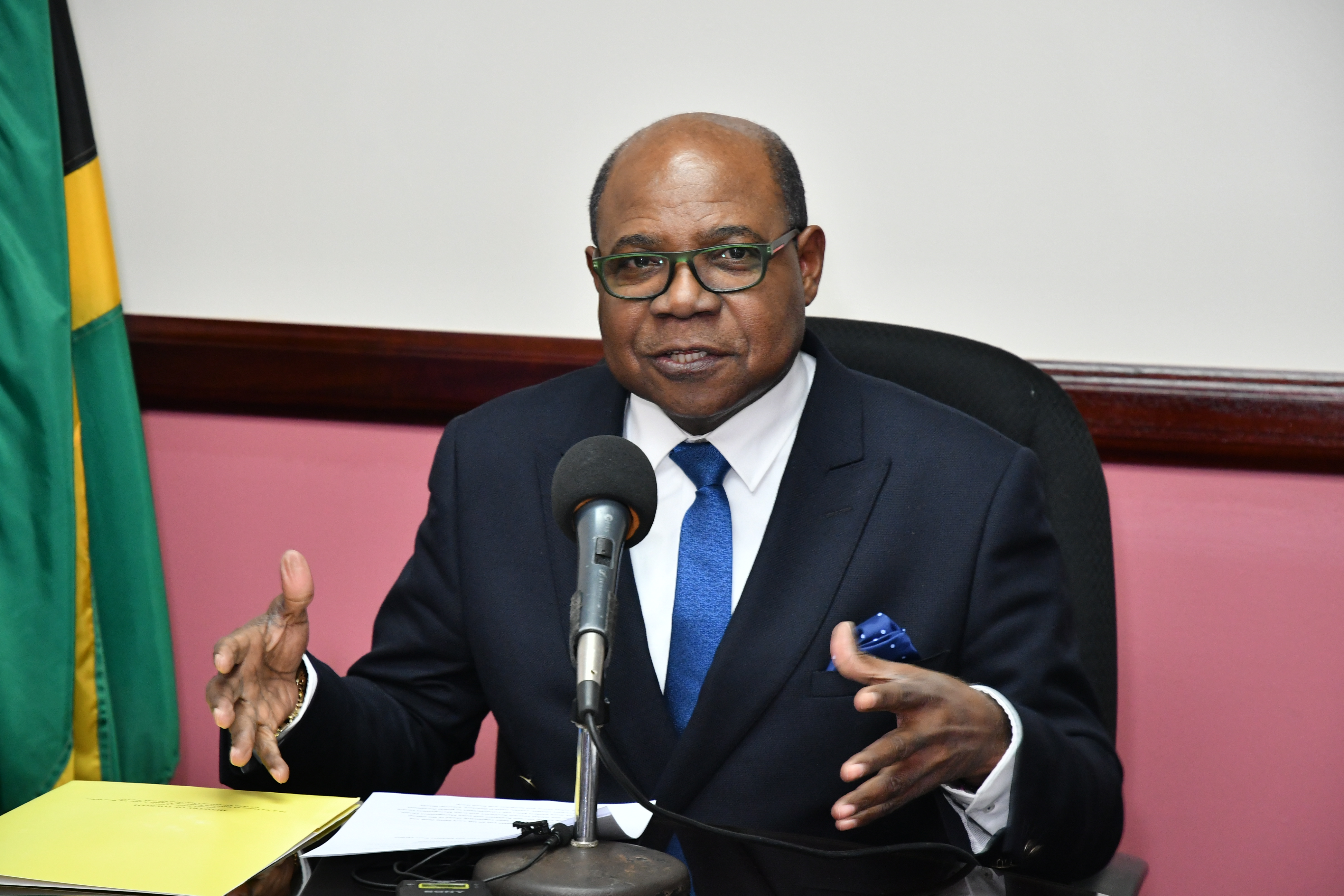
Jamaica PM speaks at launch of Global Tourism Resilience & Crisis Management Centre
At the launch of the Global Tourism Resilience & Crisis Management Centre, Jamaica Prime Minister Hon. Andrew Holness shared his thoughts on the importance of the work being initiated today through this Centre not only for tourism, but for the global economy as well.
“Over the last several years, governments and societies have become increasingly aware of the need to mainstream resilient strategies in their everyday operations. Faced with a wide range of dynamic threats, the global economy has become far more volatile and increasingly uncertain. Consequently, policymakers across all economic sectors globally are facing unprecedented demands to insure that strategies promoting resilience, mitigation, and adaptation are central to their agendas for achieving sustainable resilience.
“Of all the major industries globally, arguably none faces greater exposure to disruptive forces than the hyper-connected tourism sector. The irony of the tourism industry is that the tourism sector has also displayed this uncanny ability to recover. So there is just something about tourism that is resilient. It is the most exposed but has also demonstrated the greatest ability to recover.
“And in speculating, I was in the room when Peter [Tarlow] offered his thesis as to why this may be, and Richard in his doctoral thesis delivering here today, might have suggested that it is because travel is so important to the global economy, that policymakers go the extra mile to insure that whenever there is a global disaster that is disruptive and dislocating that we put in place very quickly the measures to open up the government or open back the government. So the thesis offered by Peter is that the government of the United States reopened as soon as it was clear that airports were about to shut down, and that is indeed the hope of travel and tourism and insuring that we and recover quickly.
“The most recent data provided by the UNWTO found that in 2018 the tourism sector grew by 4.6 percent, and that was much faster than the global economy. For Jamaica over the last 10 years, our tourism industry grew by 36 percent. That’s amazing! While the rest of the overall economy over the last 10 years grew by 6 percent. So tourism is the standout performer.
“To reinforce the point, in the last decade, Jamaica suffered terribly in the last global recession. Luckily, our financial sector did not suffer as badly as others, but the rest of our economy plummeted in 2009. In fact the latest data is showing that we are just now recovering ground where our economy has grown back to where it was in 2009 at the start of the recession. But tourism has just grown leaps and bounds, and that reinforces the point that there can be all kinds of shots to the economy, and many industries will take far longer to recover, but tourism has managed to recover very quickly. So for policymakers it is important that we study this phenomenon, we understand it, and we properly document it and assimilate it, and mainstream it into our practices to insure that whatever kind of disaster may affect us, we can actually recover.
“So, I’m very impressed with the work that is going to be done by the Resilience Center, not just for tourism but more importantly lessons that other industries can learn about speed of recovery after disasters and building in redundancies and protocols to insure that we have resilience and sustainability. It is a very important institution, and I am very happy that we initiated it and we have actually executed the Centre being launched here today.”
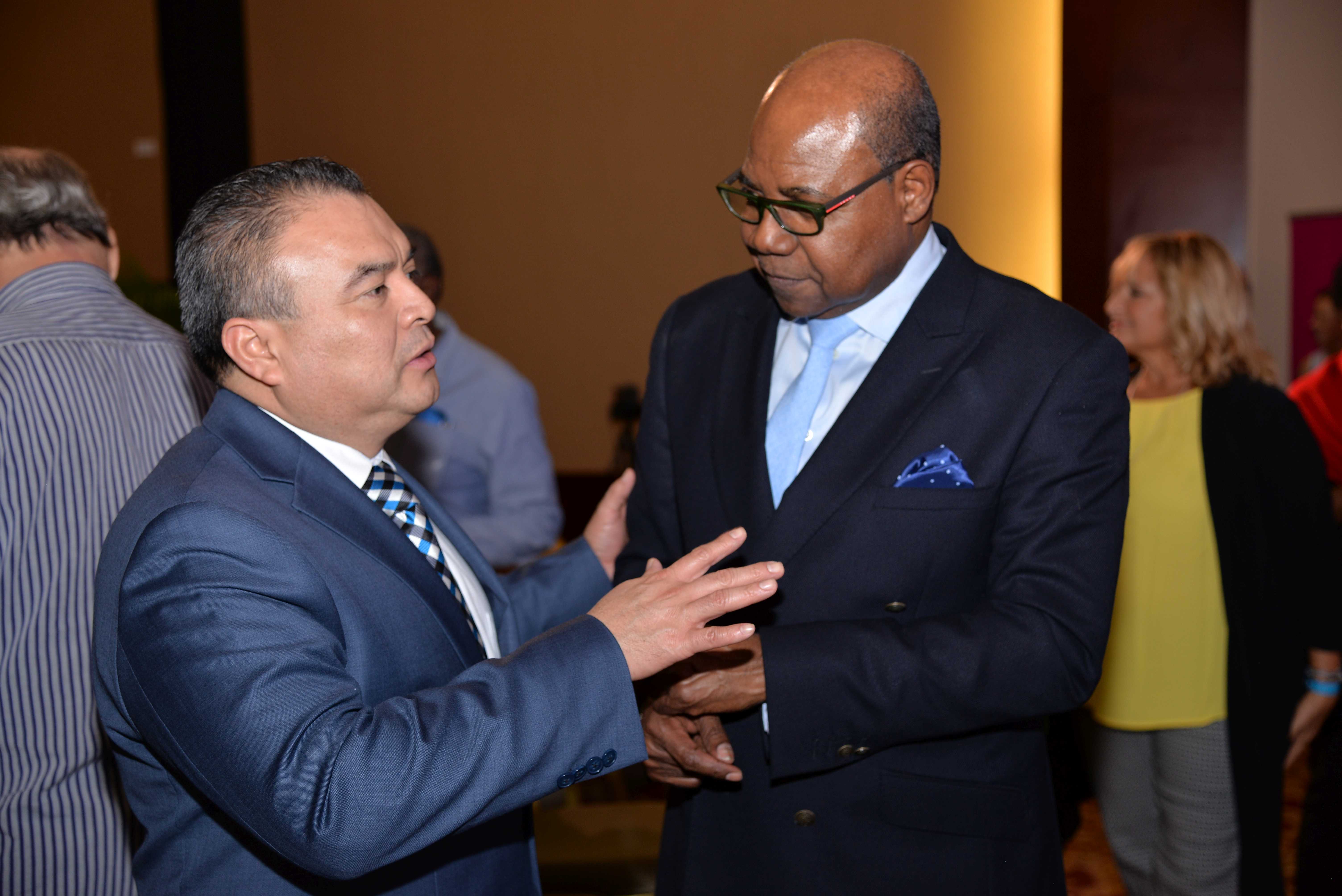
Building Resilience of Caribbean SMTEs: OAS launches $500,000 project
The Organization of American States (OAS) has launched a US$500,000 project to assist the region’s small and medium tourism enterprises (SMTEs) to build resilience to natural disasters.
The project was launched during the 2nd Global Conference on Jobs and Inclusive Growth: Small and Medium Tourism Enterprises (SMTEs), hosted at the Montego Bay Convention Centre by the government and the United Nations World Tourism Organization on January 29.
Speaking ahead of the launch, Tourism Minister Hon. Edmund Bartlett said, “We are so happy to have the vast expertise of the Assistant Secretary General of the Organization of American States (OAS), Nestor Mendez, at the launch who I am pleased to say comes bearing gifts. This very important resilience project for our SMTEs will help build the capacity of our sector to better help us become more resilient when disruptions occur.”
The project is funded by the United States Department of State and managed by the OAS Secretariat for Integral Development. It will assist small tourism enterprises in the Caribbean to overcome the various challenges that affect the ability of Governments and businesses alike to continue their business operations during and after catastrophic events in the Caribbean.
Participating countries set to benefit include: Antigua and Barbuda, The Bahamas, Belize, Barbados, Dominica, Grenada, Haiti, St. Lucia, St. Kitts and Nevis, St. Vincent and the Grenadines, Suriname, and Trinidad and Tobago.
It will be carried out in a two-year period, with the primary aim being to reduce the severity, impact and duration of disruptions caused by a disaster on the operations of the small enterprises in the Caribbean.
“The Caribbean is among the most tourism-dependent regions in the world and there is no other region whose travel and tourism industry is as vulnerable to disasters as the Caribbean. It is undeniable that climate change presents an existential threat to small island developing states and low lying coastal areas, which include the countries of the Caribbean,” said Assistant Secretary General of the OAS, Nestor Mendez.
He also noted that “The OAS identified, among the main long-term needs of the region, the need for tourism-related disaster preparedness and crisis management, communications plans as well as methodologies to follow before and after a disaster.”
This 2nd Global Conference on Jobs and Inclusive Growth: Small and Medium Tourism Enterprises (SMTEs), is a direct response to the global conference on jobs and inclusive growth hosted in Jamaica in 2017, which brought to the fore many of the perennial challenges faced by SMTEs, including issues of access to credit, marketing, technology and business development.
The conference organisers therefore saw it prudent to have another event focused solely on SMTEs and best practices that have direct relevance to their development.
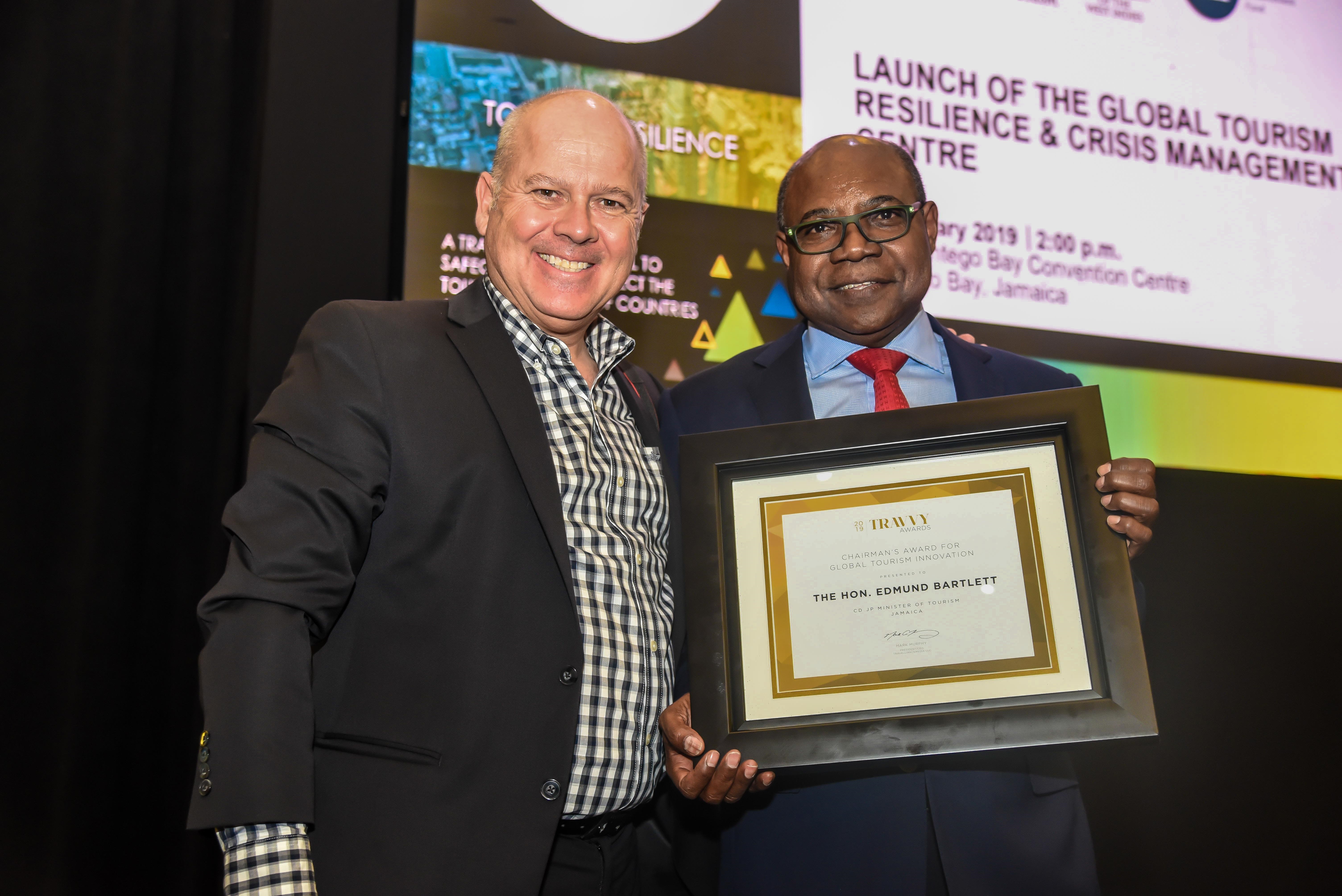
Jamaica’s Tourism Minister Bartlett receives TRAVVY Award for Global Tourism Innovation
Jamaica’s Tourism Minister, Hon. Edmund Bartlett was officially presented with 2019 TRAVVY Awards inaugural Chairman’s Award for Global Tourism Innovation for the development of the Global Tourism Resilience and Crisis Management Center (GTRCMC) during the launch of the Center on January 30 at the Montego Bay Convention Centre. The award was presented by John Kirk, President and Editor-in-Chief of TravelPulse Canada.
During the official ceremony, which took place last Wednesday in New York, the Jamaica Tourist Board (JTB) also won the best Tourist Board in the Caribbean award, while Jamaica also won: Best Wedding Destination; Best Honeymoon Destination; and Best Culinary Destination, to thunderous applause from the packed hall of primarily American travel industry stakeholders.
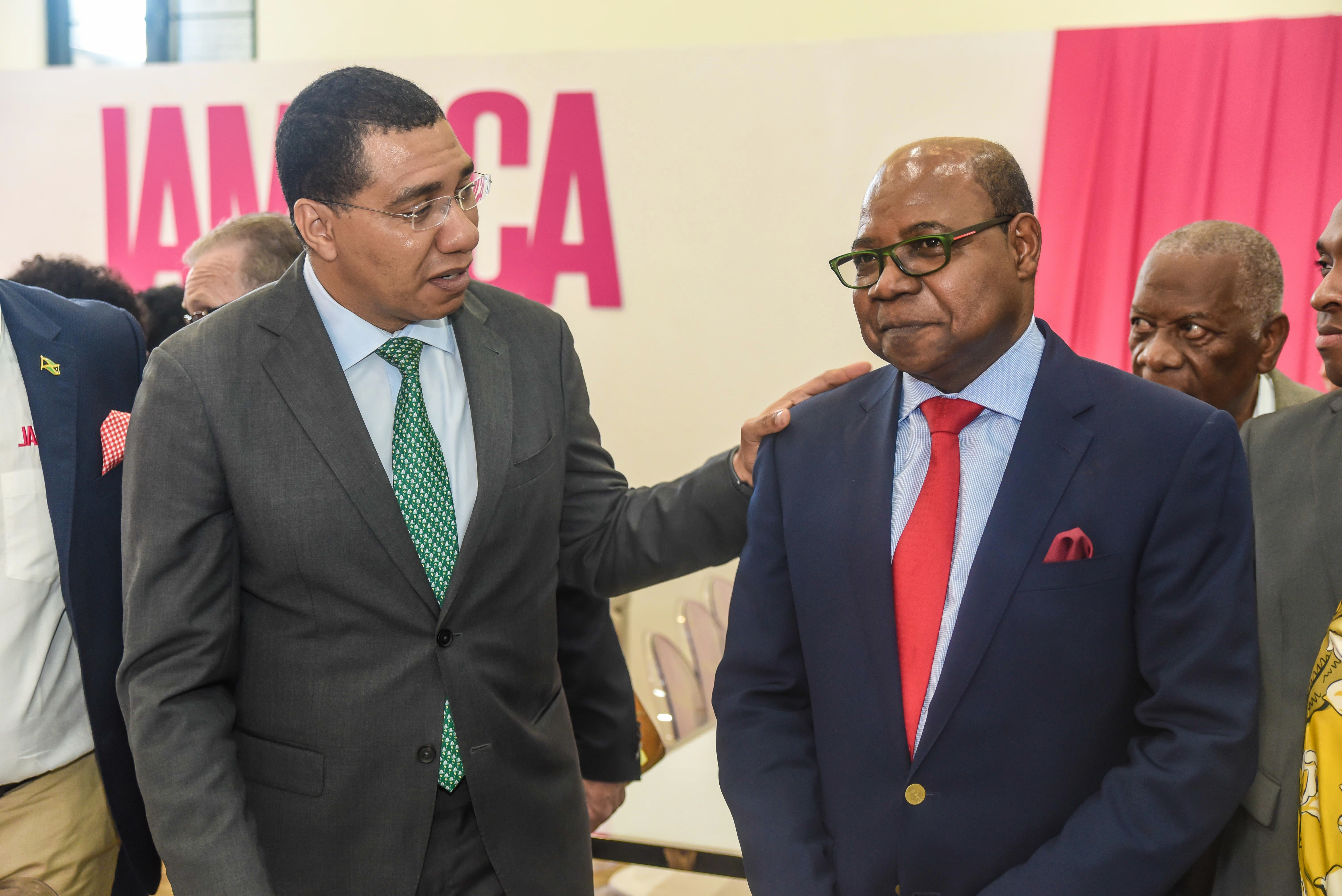
Jamaica Prime Minister calls for greater collaboration for sustainable resilience in tourism sector
Prime Minister of Jamaica, the Most Hon. Andrew Holness says that greater effort has to be placed in strengthening linkages with key industries to create a more resilient and sustainable tourism industry.
“Crisis management requires coordination and a joint-up approach from the point of view of government and stakeholders. So it is important that we get all stakeholders on board. I am very pleased with the performance of the tourism industry but tourism does not exist in a vacuum by itself.eTN Chatroom: Discuss with readers from around the world:
It has to coordinate with all the agencies and so a part of the ability to be more resilient, and to adapt is how we connect and create linkages. Resilience depends on the Ministry of Health, the Ministry of National Security, the Ministry of Science and Technology, and the Ministry of Education. Greater effort has to be placed in ensuring that, if we are going to be effective in managing crises, “said the Prime Minister.
The Prime Minister made these remarks during the launch of the Global Resilience and Crisis Management Centre at the Montego Bay Convention Centre on January 30, 2019.
“Jamaica’s strategy is not just to ensure that Jamaica is safe, but to collaborate with all other countries…visitors to the island can rest assured that they are in a safe, secure and healthy environment,” said Prime Minister Holness.
The focus of the Centre will include: Risk Assessment, Mapping and Planning; Cyberspace Policy and Counter-Terrorism; Resilience-Related Research Collaborations; Development of Innovation Systems; Coordinating resilience policies with the government, Resource Mobilization, Capacity Building and Cross-Border Intelligence-sharing.
Speaking at the launch, Tourism Minister, Hon. Edmund Bartlett said, “There are four key deliverables that the Centre is focusing on at this time. One, is the establishment of an academic journal, which will be a compendium of scholarly publications, on various elements of the 5 segments of disruptions. The editorial board has already been established, headed by Professor Lee Miles of Bournemouth University, with the assistance of George Washington University. Within the next four months, that journal will be ready,” said the Minister.
The other deliverables include: a compendium of best practices/ a blueprint for resilience; a resilience barometer to measure the resilience in countries and provide benchmarks to guide countries; and to establish an academic chair at the University of West Indies for innovation and resilience.
“I am pleased to announce that we have two proposals before us for the funding of that Chair. One is from Spain and the other is from Jamaica. We are still looking because part of what we must have are the resources to manage the facilities over time,” said the Minister.
The Centre which is housed at the University of the West Indies, will be staffed by local, regional and internationally recognized experts and professionals in the fields of climate management, project management, tourism management, tourism risk management, tourism crisis management, communication management, tourism marketing and branding as well as monitoring and evaluation.
“We are looking forward to the work that is going to be done and we want to work closely with the University of the West Indies because we believe it will be beneficial for us to understand how the rest of Government can benefit from the lessons that you can teach us, to ensure that we are resilient and can manage crises,” said the Prime Minister.
The Centre will also provide research fellowship opportunities for individuals seeking to either expand their knowledge or, gain experience in tourism resilience and crisis management, through postdoctoral research, and internships for undergraduate and graduate students in fields of study related to tourism resilience and crisis management.
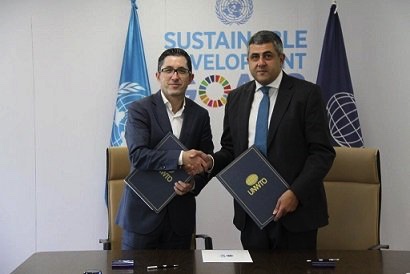
San Sebastian hosts UNWTO World Forum on Gastronomy Tourism
The World Tourism Organization (UNWTO) and the Basque Culinary Center (BCC) have signed the Agreement for the holding of the 5th UNWTO World Forum on Gastronomy Tourism (San Sebastian, Spain 2-3 May 2019). The new edition of this global forum is supported by the Ministry of Industry, Commerce and Tourism of Spain, the Basque Government, the Provincial Council of Gipuzkoa and the City of San Sebastián.
Job creation and the promotion of entrepreneurship will be this year’s special focus, in line with the 2019 UNWTO Year of Education, Skills and Jobs, closely aligned with the Sustainable Development Goals (SDGs). The forum will bring together Ministers of Tourism, representatives from National and Local Tourism Administrations, chefs, entrepreneurs, academia and related stakeholders from tourism and gastronomy to discuss latest trends and to share experience.eTN Chatroom: Discuss with readers from around the world:
The event will see the announcement of the winner of the First Gastronomy Tourism Start-up Competition. The competition, organized by UNWTO and the BCC, will bring five finalists to San Sebastian.
“Tourism is a huge source of employment and its multiplier effect has a knock-on effect on other sectors, such as gastronomy and its huge value chain involving several sectors”, said UNWTO Secretary-General Zurab Pololikashvili.
“We are especially proud to be co-organizers of the 5th UNWTO World Forum of Gastronomy Tourism. An edition that returns to San Sebastian and that grows exponentially thanks to the support of the Ministry of Industry, Commerce and Tourism of Spain, the Basque Government, the Provincial Council of Gipuzkoa and the City of Donostia. Tourism today is a sector closely linked to gastronomy. At the Basque Culinary Center, we promote knowledge through training in both sectors and work to create an ecosystem that stimulates entrepreneurship and ensures quality employment”, underlined Joxe Mari Aizega, Director, Basque Culinary Center.
Policy framework for the development of gastronomy tourism and its capacity to create jobs and promote entrepreneurship, future skills, as well as ways to support SMEs and entrepreneurships in gastronomy tourism will be addressed as well during the forum. The panel presentations will be complemented by working sessions giving all participants the opportunity to actively immerse, interact and share ideas.
The event will close with a Masterclass by the Basque Culinary Center on how to develop competitive and sustainable gastronomy tourism in destinations.
The Forum has been held since 2015.The Basque Culinary Center hosts it every two years with the aim to promote the exchange the most relevant experiences between experts in tourism and gastronomy, to identify best practices and to promote gastronomy tourism as a contributor to sustainable development.
